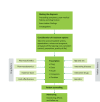Rational prescribing: the principles of drug selection
- PMID: 27697811
- PMCID: PMC6297291
- DOI: 10.7861/clinmedicine.16-5-459
Rational prescribing: the principles of drug selection
Abstract
Prescribing is the most important tool used by physicians to cure illness, relieve symptoms and prevent future disease. It is also a complex intellectual task that requires formulation of an appropriate treatment regimen from the many thousands available, taking into account the infinite variation in the patients they encounter. Unfortunately, the selection of a medicine and dosage regimen is sometimes suboptimal, leading to poor patient outcomes (eg treatment failure, avoidable adverse reactions). This article will highlight some of the common prescribing errors and will develop a rational approach that includes making a diagnosis, estimating prognosis, establishing the goals of therapy, selecting the most appropriate treatment and monitoring the effects of the treatment.
Keywords: Drug selection; interindividual variation; monitoring therapy; personalised medicine; prescribing; rational prescribing.
© Royal College of Physicians 2016. All rights reserved.
References
-
- Maxwell SRJ. Therapeutics and good prescribing. In: Walker B, editor; Colledge N, editor; Ralston S, editor; Penman I, editor. Davidson’s principles and practice of medicine. 22nd Edn. Edinburgh:: Churchill Livingstone Elsevier; 2012. pp. 17–40.
-
- British Pharmacological Society Ten principles of good prescribing. London:: British Pharmacological Society; 2010. Available online at www.bps.ac.uk/BPSMemberPortal/media/BPSWebsite/Assets/BPSPrescribingStat.... [Accessed 15 July 2016].
-
- de Vries TPGM. Henning RH. Hogerzeil HV. Fresle DA. Guide to good prescribing: a practical manual. Geneva:: World Health Organization; 1994.
MeSH terms
LinkOut - more resources
Full Text Sources
Other Literature Sources


